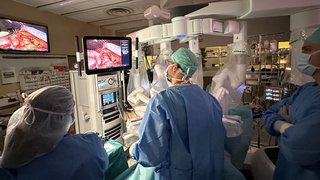Search for opportunities to participate in a digestive systems and liver disease research study.
General Gastrointestinal Surgery
New Patient Appointment or 214-645-8300
MedBlog
Results: 2 Locations
Outpatient Building
1801 Inwood RoadDallas, Texas 75390 214-645-8300 Directions to Outpatient Building, Dallas Parking Info for Outpatient Building
Pancreatic Cancer Clinic
at Cancer Care Outpatient Building 6202 Harry Hines Blvd., 9th FloorDallas, Texas 75235 (214) 645-4673 Directions to Pancreatic Cancer Clinic at Cancer Care Outpatient Building, Dallas Parking Info for Pancreatic Cancer Clinic















